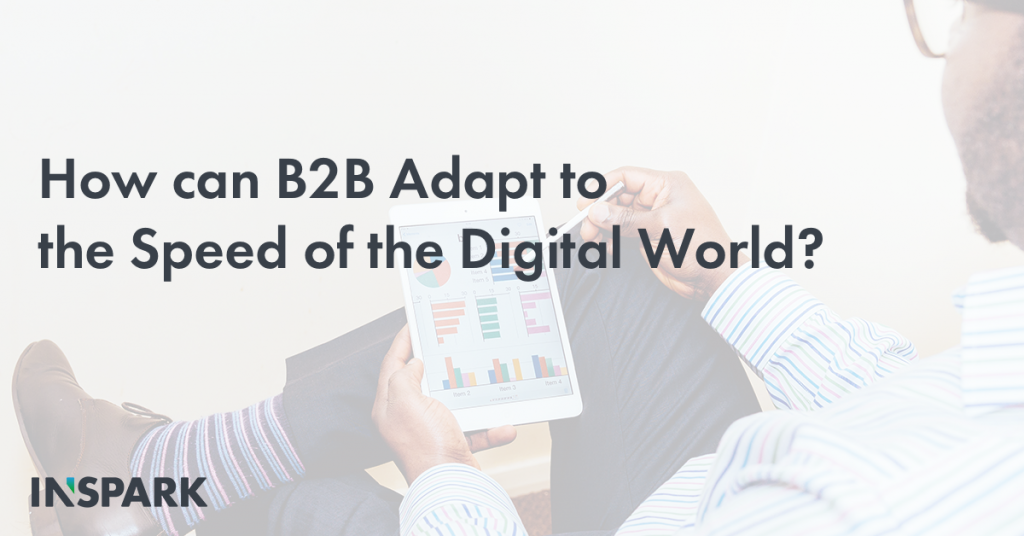
As we are all aware, the business world, like other areas of everyday life, is in a digital transformation. Although the increasing weight of digital transformation attracts attention in all sectors, what is really surprising is how fast and dynamic this transformation is.
Digitization has been seen as a development that has so far been more of a concern for B2C companies. However, being in direct contact with the customer is not the only condition to use the advantage of digitalization. The importance of digitalization was also noticed by B2B companies.
B2B companies in different industries also need to adapt to the pace of digital transformation. According to Salesforce’s study conducted with 350 B2B decision-makers, the view that growth in e-commerce was 89% in 2017, compared to 94% in 2019. It seems like the digital transformation sets to accelerate even further.
Why is digitalization important for e-commerce in B2B companies?
It is an undeniable fact that the digital revolution is a serious source of growth for B2B companies investing in digitalization. E-commerce also now has a central part, rather than being an outlet that acts as an auxiliary. More and more companies are resorting to digital ways to maximize their return on investment.
One of the reasons digitalization is so important in B2B companies is that digital channels reflect consumer needs and customer experience quite well. Digital expertise is essential to improve the customer experience in B2B, where the customer is of central importance. Of course, the way to understand the customer is through data. Data analysis and artificial intelligence are vital parts of this digital expertise.
In 2019, 59% of B2B companies focused on using data to set more accurate targets. That’s a remarkable increase from the 39% rate in 2017. By analyzing data collected from customers using artificial intelligence, many medium-or large-scale goals can be achieved, such as making customer loyalty stronger and increasing the average number of orders.
How B2B companies can kick-start digital transformation?
Technological advances and recent trends in business are affecting both e-commerce opportunities and consumer expectations profoundly. In order to gain a strong place in the sector, it is necessary to follow digitalization trends closely. B2B companies should also turn to digital-compatible marketing strategies to reach out to new consumers and increase their profit.
The first step you need to take before developing new strategies for your B2B company is to measure the path so far in e-commerce. You should look into your company’s current digital presence and capacity. An honest look at the possibilities you have will eliminate potential problems caused by poor planning in the future. It’s advised to move forward step by step.
After seeing your current capacity, you should develop your e-commerce capabilities within a plan. Although it is laborious to build a flexible system to meet changing consumer needs, the return is huge. Feedback from consumers is also very important for your progress. You need a team that constructively integrates customer feedback into your system. For all this, it would be the most professional method to contact agencies that offer digital solutions.
One area that needs to be weighed when developing digital capacity is self-service options. Self-service options make things easier for both customers and companies. The proportion of companies that say all their customers have access to self-service options is 73% in 2019, compared with 56% in 2017. One of the priority values created by e-commerce can be called the opportunity to be tied to the customers. After all, customers are no longer passive service buyers, they want to take control of their own purchasing experience.
You can start with small steps, such as providing self-service customer service in chat format from your website. As your team and customers get used to these services, you can increase the level of automation. The development of self-service options can give the wrong impression that sales teams are putting their jobs at risk. In fact, this is not the case. AI-powered self-service capabilities allow sales teams to focus on more value-generating tasks. So your employees act as consultants rather than order takers.
When considering digital transformation, you should also not neglect non-digital areas. B2B companies need to find the right combination of both online and face-to-face platforms. One point to note here is that omnichannel (multi-channel) marketing does not lose its importance. No matter how much e-commerce develops, many B2B companies do not intend to move all their services to online platforms.
The needs of B2B companies can be much more detailed and require large budgets compared to B2C companies. That’s why customers are likely to need face-to-face contact, even for tasks they can actually complete digitally. The ideal approach would be a functional digital system supported by a good face-to-face service. In your B2B company, you can decide what resources you can allocate for digital transformation accordingly.
B2B companies that focus on digital experiences are already starting to see positive outcomes. But as mentioned at the beginning, the rapid digital transformation is very decisive. In order to keep up to date with the speed of transformation, we must always keep the digital capacity up to date.
It is important to collaborate with a professional team to provide a good experience for your customers. Because your company will have other priorities, finding a partner for you to integrate digitalization trends into your business will strengthen your hand in the market. B2B companies that closely follow e-commerce trends with the help of a partner such as Salesforce will ensure their future place.
Get quick results with Salesforce Platinum Partner
As a Salesforce Platinum Partner, INSPARK supports you to get much higher efficiency from all of Salesforce’s empowering products and services. By working with the right partner, you can quickly integrate the CRM system into your business processes and get quick results by minimizing the margin of error. Platinum Partners, which are the highest level of four different consultancy categories, are re-evaluated every year to provide the highest standard of service. Thus, Salesforce makes sure that companies working with this partner representing itself receive good service in the long run.

